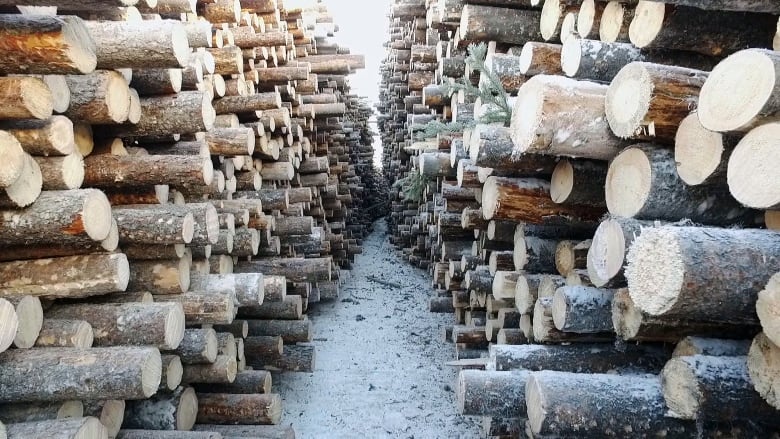Raw log exports are killing B.C. jobs, says left leaning think tank
CCPA says B.C. exported more raw logs between 2013 and 2016 than in any other 4-year period

The Canadian Centre for Policy Alternatives is calling for a ban on the export of raw logs from old growth forests and the creation of more log-processing jobs in British Columbia.
In a newly published research paper, the CCPA says B.C. has exported nearly 26 million cubic metres of wood worth an estimated $3 billion since 2013.
"There clearlyis significant forgone employment opportunitythat is associated with unprocessed materials leaving our province," saysCCPA researcher Ben Parfitt.
"If we don't get our minds wrapped around how we add more value now, the likelihood is that we will simply see a drain of our forest resources."
Timber supply running out
The CCPA says the problem is made worse by the decrease in the merchantable timber supply due to the effects of the mountain pine beetle infestation, particularly in the B.C. Interior.
One of the results, it says, is that logs need to travel further distances to mills.
"If you live in a community like Mackenzie, ripped apart by major mill closures, but has got some of that capacity back, their worry is they simply become a raw material supply,"says Parfitt.
He says the province ought to invest more in local mills.
"On the coast, we haven't had a single new mill built from the ground up since 2003," he said. "We're simply going to relinquish the job opportunities to jurisdictions outside of the countryChina being the prime example."
Parfitt says exporting more logs could lead to a situation where companies no longer have to process wood. Instead, he says, they could just export.
3-point plan to ban exports
The province says log exports are a small but important part of the forest sector.
In anemailedstatement, B.C's Ministry of Forests, Lands, and Natural Resources wrote "[log exports] only account for about sevenper cent of provincial timber harvested. Further restricting exports would put people out of work."
Unions and other groups have also joined the call for policy changes, including a ban on log exports.
"Thousands of good-paying jobs in rural communities are at risk every day that the government fails to act," saidPublic and Private Workers of Canada union president Arnold Bercov. "The carnage has to stop."
His union,Unifor, the Ancient Forests Alliance, Sierra Club of BC, and the Wilderness Committeewants the province to implement athree-point plan:
- Immediately ban on all exports of raw logs from old-growth forests.
- Immediately impose progressively higher taxes on log exports from second-growth forests.
- Introduce new policies to increase value-added forest manufacturing and jobs in rural and First Nations communities.
Earlier in February, B.C. Premier Christy Clark announced a $150 million plan to fight climate change and reduce wildfire risk by replanting ravaged forests, saying up to 3,000 jobs in rural B.C. will be created in the process.
With files from Ash Kelly.












_(720p).jpg)


 OFFICIAL HD MUSIC VIDEO.jpg)
.jpg)



























































































